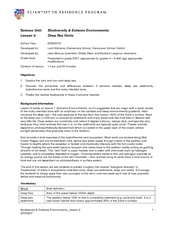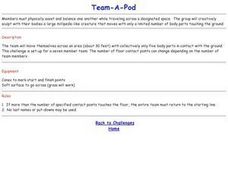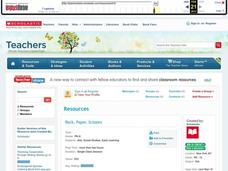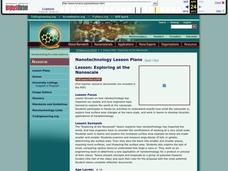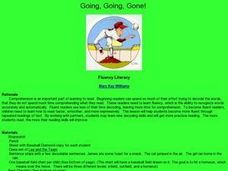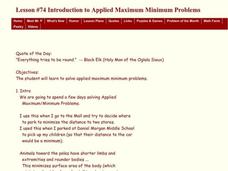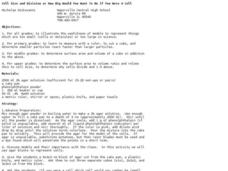Curated OER
Deep Sea Vents
Learners study the vent and non vent deep sea and see the differences in habitats. In this investigative lesson students complete a worksheet and work in groups.
Curated OER
Stopping Deforestation in the Amazon: A Publicity Campaign
Students investigate the environment by designing a group project. In this ecology lesson, students identify the man made threats to the Amazon while reading environmentally conscience vocabulary terms. Students collaborate in groups...
Curated OER
Mapping Ancient Coastlines
Most of this lesson plan is spent working on the "Bathymetry Worksheet." It includes a graph of the changes in sea level over the past 150,000 years and a bathymetric map of changes in an imaginary coastline over time. Participants...
University of Wisconsin
A Rain Garden Year
Pupils become plants in an interpretive play that depicts what happens throughout the seasons in a rain garden. As you narrate, students bloom, flower, and go to seed accordingly. The lesson is first in a series of lessons written for...
Curated OER
Top to Bottom
Marine science classes read about the 2005 North Atlantic Stepping Stones Expedition and review climate change. They use maps to locate the seamount chains. In collaborative groups, they research how climate change may be altering the...
Curated OER
Pets Around the World
Learners communicate via e-mail with other students to learn about pets, animals of interest , and geography from different parts of the world. Vocabulary focuses on rural, urban, and suburban areas.
Curated OER
Challenge Game - Team-A-Pod
This is an intermediate level challenge game that comes from a ropes course curriculum. As with most challenges for a ropes course, there is focus on communication, trust, decision making, and mostly, cooperation. There are links that...
Curated OER
Rock, Paper, Scissors
Students build rock sculptures, In this hands-on art lesson, students pile rocks into unique formations to create rock sculptures.
Curated OER
Seepy Sandwich
Students study how water infiltration can carry pollution underground. In this water infiltration lesson, students conduct an experiment on water infiltration and underground pollution.
Curated OER
Lesson 4 Lesson 2(cont.) Its a Small World (Day 4)
Students watch and discuss observations of condensation on the plastic "sky" of the container. They draw a sketch of what they see and record their observations on the Its a Small World mini booklet. Sudents investigate evaporation...
Curated OER
Exploring at the Nanoscale
Students examine how surface area increases as blocks are cut into pieces. In this technology lesson plan, students propose a new application of nanotechnology. They create charts or presentations and present them in class.
Curated OER
How Does Radon Get In?
Pupils examine the potential sources of radon entry into homes. They compute the surface area for various objects, create a sketch of their home, calculate the ratio of air leaks to the outside surface area, and conduct a radon audit of...
Curated OER
Maintaining Body Heat
Students observe and compare heat loss in various objects with surface area-to-volume ratios and transfer this comparison to the physical characteristics of animals in their environment. In small groups they conduct an experiment...
Curated OER
Animal Skin
Students investigate the skin surface to body area ratios for different animals. In this seventh/eighth grade mathematics/science lesson, students explore heat transfer between an animal’s body and the environment. Using technology,...
Curated OER
State of NY Testing Program
In this algebra worksheet, students review geometric and algebraic concepts for the state exam at the end of the year. They discuss factoring and volumes, prisms and measuring. There are over 16 pages of questions on this lesson.
Curated OER
Conditions at Sea
Students examine wave formation. In this wave lesson, students discover how waves are formed and how the weather at sea is predicted. Students study ocean vocabulary and understand the Beaufort Wind Force Scale.
Curated OER
Going, Going, Gone!
Sixth graders use the scientific method to test variables of evaporation. In this evaporation lesson plan, 6th graders test a wet handprint on a paper towel and relate this experiment to weather conditions.
Pennsylvania Department of Education
A Geometric Scavenger Hunt
Fifth graders connect their knowledge of polygons and polyhedrons. For this geometric shapes lesson, 5th graders identify and classify two- and three-dimensional objects. Students construct a polyhedron out of polygons and describe their...
Curated OER
It's a Gas - Natural Gas
Students use plastic bottles, water, and condiment packets to simulate how natural gas comes from decaying ocean plants and animals. In this natural gas lesson plan, students also fill out lab packets and answer exit questions.
Curated OER
Introduction to Applied Maximum Minimum Problems
Twelfth graders solve problems by finding the maximum and minimum. In this calculus instructional activity, 12th graders analyze certain animals identifying their maximum and minimum points. They also use bubble as part of their real...
Curated OER
Applied Maxim Mininmum Problems
Students define the maximum and minimum of an equation. For this calculus lesson, students analyze point on a graph and determine when a graph is approaching a maximum or minimum. They take a Quiz after working some review problems.
Curated OER
Cell Size and Division or How Big Would You Want To Be if You Were a Cell?
Students investigate why cells divide. In this cell size lesson plan, students observe how far a solution travels into 3 different size model cells of agar. They answer questions about the most effect movement of "nutrients" into the...
Curated OER
Roofing and Right Triangles
Students use models and symbols to represent properties of the Pythagorean Theorem. In this right triangle lesson plan, students connect real jobs to properties of right triangles. They solve word problems applying the correct ratios and...
Curated OER
Ratios of Similar Figures
Students identify the ratios of different triangles. In this geometry lesson, students identify the similarity and differences of triangles. They use the navigator to move the sides of the triangle around.


